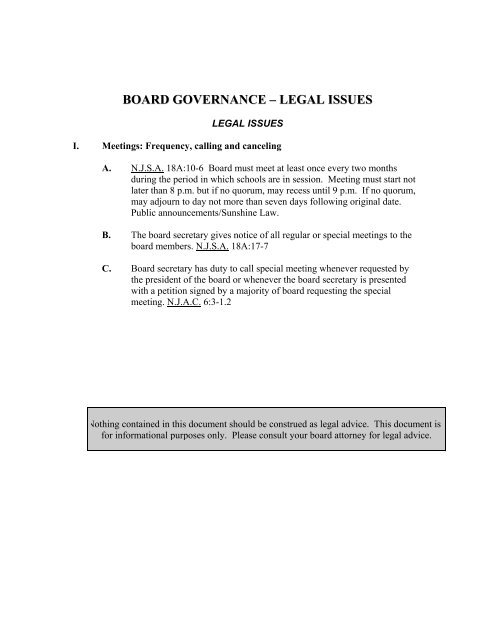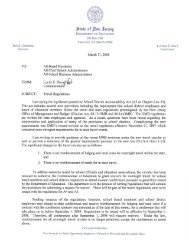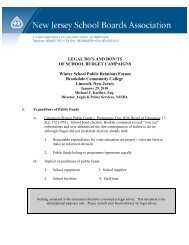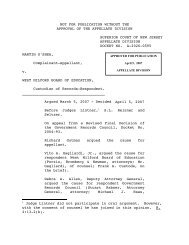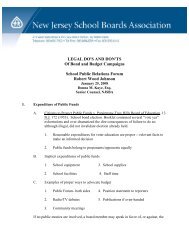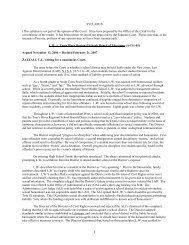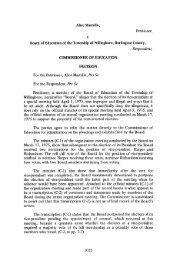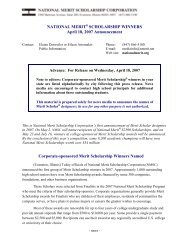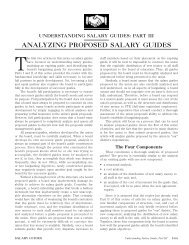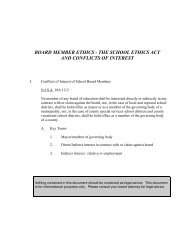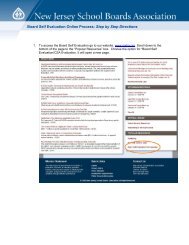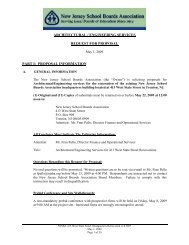board governance – legal issues - New Jersey School Boards ...
board governance – legal issues - New Jersey School Boards ...
board governance – legal issues - New Jersey School Boards ...
You also want an ePaper? Increase the reach of your titles
YUMPU automatically turns print PDFs into web optimized ePapers that Google loves.
: , , ( ) ,,,,,,,,,,,,,,,: , ( ) ,, ,, ( ) ,, ,, ( ) , , ,,,,,,;? : , , ,, [3 ] ,,,,,94 :,,,,,,,,,,,, ,,, ,,,,,, , ,,,,: ,,, ,,,,,, ,,,,,, ,,,,,,,,;,,, ( ) ,,, ( ) ,, ( )
52. Settle v. Pennsville Bd. of Ed. and Pennsville EducationAssociation, 2001 S.L.D. (April 26). Commissioner is withoutjurisdiction to determine whether the <strong>board</strong> could consider agrievance filed by the association seeking the removal or disciplineof a <strong>board</strong> member for her involvement in a dispute over astudent’s grade because Commissioner has no authority to interpretcollective bargaining agreements. Moreover, Commissioner hasno jurisdiction to address alleged Open Public Meetings Actviolations since alleged violations not ancillary to a school lawissue.D. See NJSBA policy, File Code 9114Seeks amendment to allow <strong>board</strong>s to remove <strong>board</strong> members for failure toattend 2/3 of the meetings annually, without good cause.IV.Resignation of Board membersA. What is required for a <strong>board</strong> member to effectively resign?A <strong>board</strong> member cannot be compelled to serve. Therefor, if a resignationis clearly communicated to and received by a <strong>board</strong>, it is effective, evenwithout a formal vote by the <strong>board</strong> and even if the <strong>board</strong>’s ordinarypractice is to vote on resignations. Silberstein v. Lakewood Bd. of Ed.,1990 S.L.D. 491.B. Can a <strong>board</strong> member rescind his resignation?Yes, but only before the resignation becomes effective. Once it is clearlycommunicated and received by a <strong>board</strong>, a vacancy has been created. The<strong>board</strong> may fill the vacancy as provided for in statute. (see Section IV)V. Filling <strong>board</strong> vacancies N.J.S.A. 18A:12-15A. How are they filled?In most cases, a vacancy is filled by a majority vote of the remainingmembers of the <strong>board</strong> after the vacancy occurs. The <strong>board</strong> has 65 days tofill the vacancy; if it does not meet deadline, county superintendent willfill vacancy.
7Majority of the quorum: Vote to ratify a collective bargaining agreement,adopt policy, approve bills.Majority of the full <strong>board</strong>: Vote to appoint teachers and administrators, toadopt the budget, and to withhold the increments of a teaching staffmember.B. Board may not require supermajority vote unless statute specificallyprovides; thwarts will of majority to require a greater vote than requiredby statute. Matawan Teachers Ass’n v. Bd. of Ed., 223 N.J. Super. 504(App. Div. 1988)C. In sending- receiving districts, the sending representative may vote onlyon certain matters. (see Section VII below.)The number of <strong>board</strong> votes required to pass a motion will be based on thenumber of members eligible to vote on a particular matter, which may ormay not include the sending representative (s).VII.Sending Representation on Receiving BoardA. N.J.S.A. 18A:38-8.2B. Branchburg Bd. of Ed. v. Board of Education of Somerville, United StatesDistrict Court, District of <strong>New</strong> <strong>Jersey</strong> Civil No. 98-5557 (AET) (Consol.)(September 7, 2000) <strong>New</strong> <strong>Jersey</strong>’s formula for sending districts’ votingrepresentation on receiving district <strong>board</strong>s of education is unconstitutionalas applied to the sending-receiving relationship between the Somervilleand Branchburg Township <strong>board</strong>s. Court asks that within 60 daysCommissioner recommend a constitutionally permissible manner forresolving the problem, until Legislature formulates a legislative solution.C. Branchburg Bd. of Ed. v. Bd. of Ed. of Somerville, et al., United StatesDistrict Court, District of <strong>New</strong> <strong>Jersey</strong> Civil No. 98-5557 (AET) and 99-822 (AET) (Consol.) (May 22, 2001) Commissioner failed to recommenda constitutionally permissible manner for resolving the votingrepresentation problem nor could the parties reach a standstill agreement.Court ordered remedial plan be implemented whereby Branchburg wouldappoint six (6) members to the Somerville <strong>board</strong>, each with one vote,giving Branchburg control of 40% of the votes on matters affecting theirhigh school students while enabling Somerville to maintain a majorityvote. Somerville's motion to stay the remedial plan denied becauseSomerville maintains majority vote and may continue to operate thedistrict. No irreparable harm demonstrated. On appeal to Third CircuitCourt of Appeals.
8D. English v. Board of Education of the Town of Boonton, 135 F.Supp.2d588 (D.N.J. 2001) <strong>New</strong> <strong>Jersey</strong>’s formula for sending districts’ votingrepresentation on receiving district <strong>board</strong>s of education is unconstitutionalas applied to the sending-receiving relationship between the Lincoln Parkand Boonton <strong>board</strong>s. Parties directed to propose joint resolution toproblem by April 30, 2001 or, failing a consensual solution, theCommissioner of Education directed to submit proposal by May 18, 2001with response by plaintiff by May 31, 2001.E. English v. Board of Education of the Town of Boonton, 2001 WL1018368 (D.N.J.) August 21, 2001, Two-tiered voting structureestablished by the Court. Sending district to have 4 representatives, eachwith 2.5 votes. On high school <strong>issues</strong> sending district has 10 votes,receiving district 9 votes. Remedy to remain in effect until <strong>New</strong> <strong>Jersey</strong>Legislature amends the statute. Stay granted <strong>–</strong> Court of Appeals 9/24/01.Formal hearing to follow.VIII. Voting in sending-receiving districtsA. Sending district’s representative is permitted to vote on the followingitems listed in N.J.S.A. 18A:38-8.11. Tuition charged to sending district, and bill lists or contracts forpurchase, operation or maintenance of facilities, equipment andinstructional materials to be used in the education of the pupils ofthe sending district.2. <strong>New</strong> capital construction to be used by sending district pupils.3. Appointment, transfer, or removal of teaching staff membersproviding services to pupils of the sending district, includingteaching staff members who are members of the receiving district’scentral administrative staff.4. Addition or deletion of curricular and extracurricular programsinvolving pupils of the sending district.B. In addition, sending district’s representative may vote on:1. Procedural matters such as election of <strong>board</strong> officers and otherprocedural matters related to “the orderly conduct of Boardoperations.”
9C. Although the sending district’s representative may not vote on <strong>issues</strong> otherthan those listed above, the representative may:1. Participate in discussions of all <strong>issues</strong>, even those on which he/shehas no vote (however, it is improbable that the appointee will findneed to participate in discussions of <strong>issues</strong> on which he has novote).2. Receive copies of information distributed to other <strong>board</strong> members.D. The sending district’s representative may not disclose confidentialinformation to the other members of the sending <strong>board</strong>.1. He/she may communicate confidential/items freely with thesending district’s superintendent, who is required to maintain strictconfidentiality.2. The representative may communicate non-confidential informationto the other members of the sending <strong>board</strong> at a <strong>board</strong> meeting.Lincoln Park Bd. of Ed., v. Boonton Bd. of Ed., 1997 S.L.D. (May 30);Little Ferry Bd. of Ed., v. Ridgefield Park Bd. of Ed., 1997 S.L.D. (July24); Green Twp. Bd. of Ed. v. <strong>New</strong>ton Bd. of Ed., 1997 S.L.D. (August5).IX.AppointmentsA. General rule: A <strong>board</strong> may not vote to appoint for a position that will notbe vacant during that <strong>board</strong>’s lifetime. Barckett v. Garfield Bd. of Ed.,1990 S.L.D. (August 30) An appointment in anticipation of a vacancy isproper only where the <strong>board</strong> making the appointment is still in office whenthe vacancy occurs; otherwise, the present <strong>board</strong> has no right to interferewith the rights of a successor <strong>board</strong> to make that decision.B. When can your <strong>board</strong> appoint a new superintendent? Gonzalez v.Elizabeth Bd. of Ed., 325 N.J. Super. 244 (App. Div. 1999) A school<strong>board</strong> may not appoint a new superintendent whose term begins only aftera successor <strong>board</strong> is sworn in.Example: If superintendent has a 3-year contract that expires July 1, 2001,notice of nonrenewal must be given by July 1, 2000. N.J.S.A. 18A:17-20.1. But only the <strong>board</strong> as constituted at the April 2001 election may fillthe vacancy. Appointment is made through a recorded roll call majorityvote of the full membership of the <strong>board</strong>. N.J.S.A. 18A:17-15
10See, also, Dunn v. Elizabeth Bd. of Ed., 96 N.J.A.R.2d (EDU) 279, aff’dSt. Bd. 96 N.J.A.R.2d (EDU) 285. Superintendent may be relieved of hisduties for remainder of contract (with pay) N.J.S.A. 18A:27-9, but maynot be reassigned. Board may employ “acting” superintendent forremainder of contract period, but new appointment may not be made untilafter contract expires.West Village Civic Club, Inc. v. Manchester Twp Bd. of Ed, State Board,1996 S.L.D. (June 7) , Graham v. Kearny, 95 N.J.A.R.2d (EDU) 510.Parties may extend an existing contract but the contract may notrun more than a total of five years from its start.Parties may rescind superintendent’s contract prior to itsexpiration, and enter into new contract of 3-5 years; <strong>board</strong> mustprovide clear public notice of its intentions to rescind the oldcontract.C. Recent Decisions1. Howard v. East Orange Bd. of Ed., 2001 S.L.D. (June 5)Failure to renew superintendent’s contract before July 1 or givenotice of nonrenewal pursuant to N.J.S.A. 18A:17-20.1, triggerednew contract with same provisions as expired contract including5% salary increases.2. Kohn v. Vineland Bd. of Ed., 2001 S.L.D. (Sept. )Board of Education acted il<strong>legal</strong>ly in buying out superintendent’sfive-year contract for 33.3% of salary, and placing him in anotherposition with a lesser salary, notwithstanding contract clause soauthorizing.X. Does the <strong>board</strong> have the authority to decide whether to renew employees?A. N.J.S.A. 18A:27-4.1; Velasquez v. Brielle Bd. of Ed., St. Bd. 1997 S.L.D.(Aug. 8); N.J.A.C. 6:3-4.2Board of education can only renew an employment contract if theCSA so recommends, and then by recorded roll call majority voteof full <strong>board</strong>.However, even if the CSA does not recommend renewal, and theemployee is notified by the CSA of nonrenewal, the <strong>board</strong> is notforeclosed from renewing the contract of such an employee. The<strong>board</strong> may renew the employment if the employee requests awritten statement of reasons and an informal appearance before the
11<strong>board</strong>, during which the employee convinces the <strong>board</strong> to offerreemployment.On the other hand, even if the CSA recommends reemployment tobegin with, the <strong>board</strong> need not renew, as long as its decision is notarbitrary and unreasonable (“capricious”).These provisions requiring the superintendent’s recommendationapply to renewal of employees except for treasurer of schoolmoney, election officer, <strong>board</strong> auditor, <strong>board</strong> attorney, and <strong>board</strong>secretary who does not perform SBA functions.XI.Access to Personnel RecordsHorner v. Kingsway Regional, 1990 S.L.D. 752.Applicants: Board members may access official files of all applicants foremployment.Employees: Board members may access personnel files of those employeesrecommended to the <strong>board</strong> for specific employment action “to the extent that suchfiles are relevant to the specific action to be taken or deemed pertinent by the CSAin response to the Board’s directive to provide information essential forperformance of a specific, officially assigned Board duty.”Beatty v. Chester Bd. of Ed., 1999 S.L.D. (August 31).Board may not limit access only to those candidates considered by personnelcommittee. May place reasonable restrictions on times and places for review ofmaterial.Ciambrone v. Bloomingdale Bd. of Ed., 2000 SLD (May 7)Access to personnel materials: Board must ensure that individual <strong>board</strong>members’ access to personnel information is confined to that necessary for theperformance of essential <strong>board</strong> member duties; however, Commissioner has nojurisdiction over teacher’s invasion of privacy claim for sanctions againstindividual <strong>board</strong> member who accessed her personnel records.XII.Indemnification (reimbursement of <strong>legal</strong> fees and costs)N.J.S.A. 18A:12-20 Whenever a civil, administrative, criminal or quasi-criminalaction or other <strong>legal</strong> proceeding has been brought against a <strong>board</strong> member for anact “arising out of and in the course of the performance of his duties as a memberof a <strong>board</strong> of education” the <strong>board</strong> of education shall defray all costs of defendingsuch action. In criminal or quasi-criminal matters, the <strong>board</strong> of education shall
12defray the costs if the final disposition of the action is favorable to the <strong>board</strong>member.P.L. 2001, Chapter 178, Effective 7/26/01, Attachment IVQuick v. Old Bridge Bd. of Ed., 308 N.J. Super. 338 (App. Div. 1998)Board member who in good faith defended lawsuit brought by <strong>board</strong> toexclude her from attending certain closed door meetings, was entitled toreimbursement for <strong>legal</strong> expenses. Was sued by reason of her <strong>board</strong>membership.Errington v. Mansfield Bd. of Ed., 100 N.J. Super. 130, (App. Div. 1968)Board member was not entitled to reimbursement of <strong>legal</strong> fees fordefending defamation lawsuit brought against him for publishing allegedlydefamatory letter; letter was not an act “arising out of” duties of <strong>board</strong>member.Board has no obligation to indemnify for proceedings that areadministrative in nature, like those before administrative tribunal or intraffic court. Board may indemnify, but is not required. Passaic Bd. of Ed.v. Fernandez, 1996 S.L.D. (Oct 10) (Board was not required to indemnify<strong>board</strong> member who was exonerated in a matter before EthicsCommission). [Note: The holding in this matter is no longer good law, inlight of P.L. 2001 Chapter 178.]<strong>legal</strong>\webpage\<strong>governance</strong> outline


